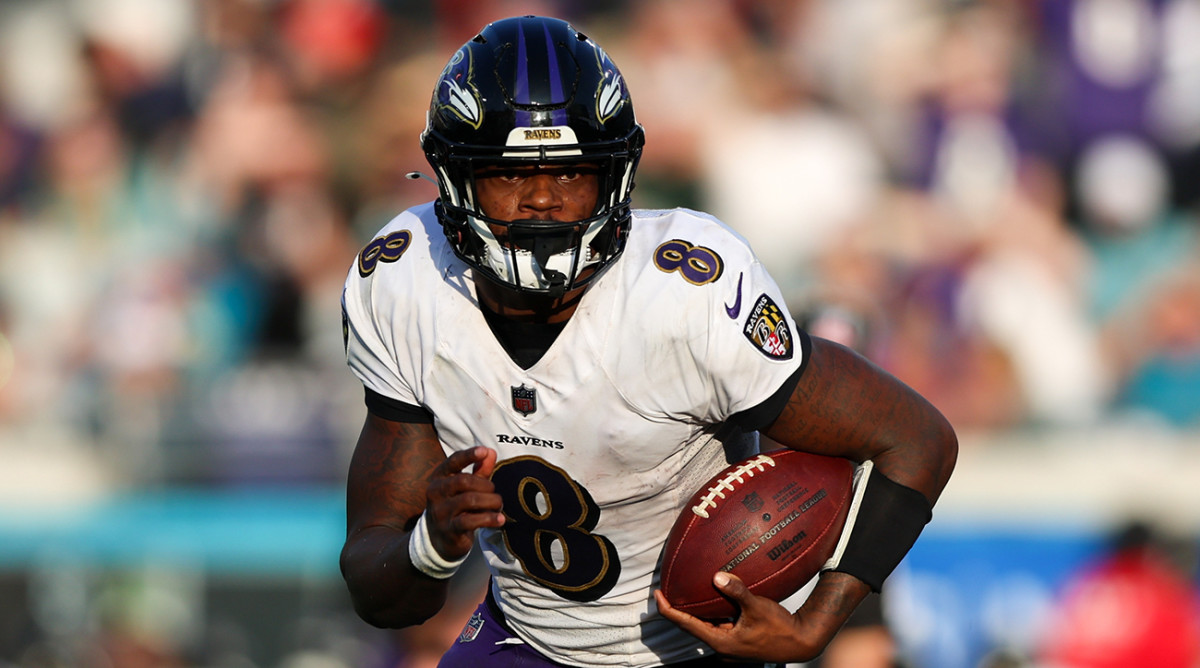Lamar Jackson Is Worth More to the Ravens Than Any Other NFL Team

As a group, NFL owners deserve every bit of skepticism they receive. They have earned it. If you have a theory that they have conspired to inflate egg prices, then I want to hear it! But in the case of Lamar Jackson, as much as I want to believe there is mass collusion to avoid giving him a fully guaranteed deal, I just don’t.
I’m sorry. I really tried, I promise.
The argument sounds good. When quarterback-needy teams such as the Falcons quickly leaked that they were not interested in signing Jackson, a lot of smart people smelled a fish. After all, Jackson is widely believed to want a fully guaranteed contract, and NFL teams are loath to make that the standard. Collusion seems to make sense. But other explanations make more sense.
The question of whether you would want Lamar Jackson on your team and whether you would try to sign him now are entirely different questions. Free agency is not just about talent acquisition. It is about choices. I’m sure the Chiefs would love to have Frank Clark on their team next year, but they just released him because teams can’t pay everybody their market value. The salary cap forces teams to choose.

Of course a number of teams should want Jackson. He is better than what they have. But should they try to pay the price it would take to get him right now?
We don’t know exactly what that price would be. Last year the NFL Network reported that the Ravens offered Jackson a deal that would’ve guaranteed him $133 million. There has been widespread speculation, fed in part by Baltimore owner Steve Bisciotti’s comments on Deshaun Watson’s deal with the Browns, that Jackson wants a fully guaranteed contract. Jackson, who represents himself, can ask for whatever he wants. It’s his right. And since he is a 26-year-old former MVP, it would be perfectly understandable if he believes he should get a market-setting contract.
Anybody wondering why Jackson was allowed to explore the market while the Giants kept Daniel Jones out of it is missing the point. The Ravens surely would have signed Jackson to the same deal Jones took. They offered Jackson a better contract last year.
Jackson is believed to want a deal in the same stratosphere as what Watson (five years, $230 million fully guaranteed) and Russell Wilson (five years, $245 million, $161 million guaranteed) signed last year, which is way more than what Jones got.
Anybody who offers that would expect him to play near the level of his 2019 MVP campaign—and he certainly might. But the past two seasons, Jackson has not reached that level consistently. He also did not finish either season because of injuries, which brings up another very legitimate concern. Jackson is a special player because he is multidimensional. If he loses his explosive running ability, his value drops significantly. We all know that smart teams have stopped paying older running backs a ton of money in part because they peak so early. I don’t expect Jackson’s running ability to decrease at the same rate as, say, Ezekiel Elliott’s, but it’s reasonable to think he will not be the same runner at 30 that he was at 23.
If you are willing to put those concerns aside because Jackson is so great when he is at his best, that is understandable … but even then, there is more to the price than dollars. Any team that signs Jackson would owe the Ravens two first-round picks—and not just any two first-round picks. They have to be first-rounders in 2023 and ’24.
Not all first-rounders are created equal. When the Rams acquired Matthew Stafford and the Broncos traded for Wilson, they believed they were surrendering late-first-round picks. They turned out to be wrong, but that was what they believed. Most teams that need quarterbacks pick in the top 10. The Falcons, who appeared to be a good landing spot for Jackson, have the No. 8 pick; they could use that on a quarterback, or draft another premier talent and ride with second-year quarterback Desmond Ridder. If they would rather keep the pick and have a quarterback on a rookie contract than Jackson on a top-of-the-market deal, there is logic to that, and, speaking of the Falcons …
One year ago, Atlanta, like several other teams, went hard after Watson. It was repugnant, because 29 women shared accounts of Watson assaulting or harassing them, and teams barely even pretended to care. But that is what happened. The Browns landed him, in part, because they guaranteed his whole contract. Where was this collusion then?
So let’s say a team is willing to ignore declining-performance concerns, injury concerns, salary-cap concerns and draft-capital concerns. That team would have to fork over two first-round picks and offer a deal so big that the Ravens won’t match it.
The Ravens are one of the smartest teams in the league. They are a perennial playoff team. They have built their entire offense around Jackson to a degree that no other team can replicate immediately, because those teams have not had Jackson on their roster for the past four years. Whatever Lamar Jackson is worth, he is worth more to the Ravens than to anybody else. Of course teams are wary of outbidding Baltimore. I would be, too. Now please: Tell me more about those eggs.
